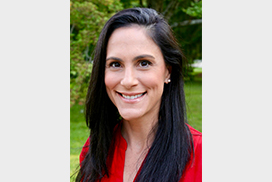
When Lauren Patterson was in law school she wasn’t necessarily thinking she would work for big law firms her entire career. She was attracted to the lawyer’s discipline—analytical and organized thinking and the nuts and bolts of conducting business overall. Like others with a newly minted J.D., she began as a litigator—and spent five years as a single woman at prestigious Miami firm. Though she soon knew she was not cut out for the regimented law firm life, she also knew she was building a strong and versatile foundation for a flexible and multi-faceted career.
After five years of corporate and commercial litigation, Lauren got married and moved to New York City. This was an opportune time for a career pivot: she decided she’d prefer to apply her law training to the non-profit world. It was not an easy switch because non-profits initially saw her only in a “big law firm” mold. She persevered, helping recruiters connect the dots between the skills used as a litigator and the legal and general business expertise needed at non-profits. She made the sale, starting with a five hours per week, one-year stint as a remote legal adviser to a conservation non-profit in Washington, D.C.
Then when she wanted to live and work in the same place, she got deeper into the non-profit world through an internship at the National Multiple Sclerosis Society. She wasn’t afraid to trade her loftier “Attorney” title for “Volunteer Manager”—knowing that the internship would give her a 360-degree view of a major non-profit. Her exposure spanned legal, marketing, recruiting, fundraising, event planning, training and budgeting, and the internship morphed into a more permanent part-time job. By now she had an infant—and the 20-hour per week schedule was a great blend of work and life.
Lauren loved her non-profit work, and then wanted to make a difference in a new way. With an eye toward helping the environment, she moved toward another flexwork option…being her own boss. For the next five years (now with two young children) she created a unique and highly acclaimed venture, Little Swappies—a collaborative consumption company that helped families reduce and reuse their children’s outgrown clothing, books, toys and gear. On her own schedule and with a small staff and 100 volunteers she created a full calendar of corporate-sponsored “swapping” events—where more than 6,000 attendees eventually kept at least 50,000 children’s items in use and out of landfills.
Though there is no greater flexibility than being your own boss, Little Swappies was multiplying in popularity, business complexity and the amount of time Lauren needed to invest. Knowing entrepreneurs need to monitor their work-life ratio as much as corporate employees, Lauren decided to put this business on hold (she’s considering next phase options)—comfortable that the business she created had made its mark and a significant difference. At the same time her husband was ready for a change after nearly two decades in finance, so the couple made the big decision to take a sabbatical and move their family from New York City to a surfing village in Costa Rica.
Lauren’s husband was in full sabbatical mode from Day One, but she still wanted to find a flexible way to work. With a tourist visa she was not able to work in Costa Rica, so she explored other alternatives. During her Little Swappies venture she had met Jamie Cheney, a woman who co-founded Prokanga, an innovative recruiting firm (and member of the Flexwork for Women Alliance that helps women find flexible work opportunities in and outside of the U.S. Jamie told Lauren about an opportunity to work with a European-based company that helps students get into leading graduate programs worldwide.
Now Lauren is working for this small company thousands of miles away with a time difference of seven hours. As an independent contractor she has a part-time schedule of about 20 hours per week—and her work hours fit neatly into her children’s school schedule. Technology makes it possible for her to be a very visible part of the company’s team: she schedules all virtual meetings in her morning hours through Skype, Zoom and Google Hangout. She knows her colleagues from the computer screen only—so far there has not been a business need to meet in person.
As the company’s Director of Business Development, Lauren continually finds ways to capitalize on her law training. She keeps all facets of the firm moving as they help students around the world complete graduate school applications, write essays and prepare for interviews. She drafts and reviews contracts—and expands her portfolio of skills to hiring new coaches, developing marketing strategies and contributing to long-term strategic planning. The firm’s small team is largely virtual—including working mothers who live on three different continents.
With her current flexwork arrangement Lauren feels there are literally no boundaries for women to pursue work alongside life. She has consistently chosen work that accommodates her family and never given up on the fact that she wants to keep growing professionally.
“My ambition was to always have work in my life, but it’s never been about making a certain amount of money or achieving a certain title. I’ve carved out my own definition of ambition and success—and I’ve never limited my job possibilities to one geographic area or one narrow professional box.”
Thinking about less traditional work but not sure what kind of flexwork fits your family and finances? ,“6 Flexible Work Options: Which is Right for You? More help on blending work and life will be found in my upcoming book, Ambition Redefined: Why the Corner Office Doesn’t Work for Every Woman & What to Do Instead (October, Nicholas Brealey, Hachette Book Group).

 0
Comments
0
Comments

